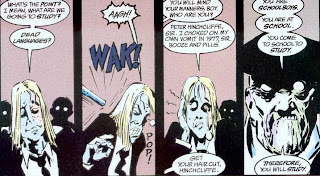In Pratchett's fantasy world gods exist if they have believers, otherwise they fade to barely a whisper, their minds fractured, barely keeping themselves together. Some start there but manage to work their way up to real power through accumulating believers. This means that they have to work out how to manipulate people into following them, which doesn't bode well for the cause of truth, love and justice. Indeed through the course of Small Gods it's a human who teaches the small god Om ethics, a way of leading a people to treat others more fairly and with respect.
The hypocrisy of the harsh religious system in Omnia is plain and some are brimming to just escape from the rules, while others find meaning in enforcing them. But when it comes down to it, what do the religious sacrifices they make or the battles fought in the name of honour or revenge gain them?* If this is a kind of bargaining with the gods, it’s a poor deal. I think we need this sort of clarity in thinking about why we do the things we do. Our culture is tied up in pursuits, whether of influence, reputation on- or offline, expertise, deeper relational links, a hoard of commercial products we feel we need, the avoidance of any pain or suffering, the best holidays, and constructed meaning in other ways. What does all of this gain us in the long run? Is the key not to obsess and just find balance? And what does it gain us in the face of death and beyond that eternity? When we realise we are going somewhere next and that we can't take anything with us, why do we get so caught up in so many pursuits which seemingly can continue all our lives?
If our ultimate destination is to be a kind of wimpy non-physical confused and hopeless half-life, I'd hate it too. Maybe this is what people fear most today: being insignificant, being unfulfilled in this life and withering away. They want to live fully and die young and happy. I can relate to this. But as a Christian I want to challenge the assumptions here - I want to say that living into old age, disability, or insignificance in the eyes of the world and living even in weakness and illness can be real living if it's done in relationship with God. If real love is experienced. If you are getting to know him and trust him better, if you are awaiting his promise to bring a kingdom where you can fully be with him, if you see his goodness no matter your situation, weakness can be a time of blessing. Furthermore if we have a hope beyond this life in the one man who came back from death, Jesus-Christ, the God-man, we do not have to have a fear of death and can get on with living for what really matters.
--------
*You wonder if there was this kind of hotchpotch of mixed motives in the recent march on Tripoli. There must be stories to be found there both of altruism and, sadly, brutish steamrolling over the ones in the way.
Cover image uploaded from Wikipedia to illustrate the book I'm discussing. It's originally derived from a digital capture (photo/scan) of the book cover (creator of this digital version is irrelevant as the copyright in all equivalent images is still held by the same party). Copyright held by the publisher or the artist. Claimed as fair use regardless.









